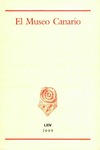Identificador persistente para citar o vincular este elemento:
https://accedacris.ulpgc.es/jspui/handle/10553/58803
| Campo DC | Valor | idioma |
|---|---|---|
| dc.contributor.author | Henríquez Jiménez, Santiago José | en_US |
| dc.date.accessioned | 2019-12-16T20:11:24Z | - |
| dc.date.available | 2019-12-16T20:11:24Z | - |
| dc.date.issued | 2009 | en_US |
| dc.identifier.issn | 0211-450X | en_US |
| dc.identifier.other | Dialnet | |
| dc.identifier.uri | https://accedacris.ulpgc.es/handle/10553/58803 | - |
| dc.description.abstract | Con abundancia, en amplio grado, suficiente, los estudios del siglo XX sobre el género de viajes ignoran el valor literario, singular y característico de aquellos relatos del xvm. La mayor parte de los trabajos publicados sobre este género versan sobre su importancia social, de lo que el viajero vio, cómo se entretuvo y cuáles fueron, en total, sus experiencias. De entre todos ellos, el viaje romántico es el de mayor importancia. El análisis sobre la influencia pictórica y artística que abunda en los relatos de viajes del xix aporta ilustraciones variopintas sobre esta nueva clase de viajeros. Nuestro estudio se detiene principalmente en descubrir las dificultades de análisis que giran en tomo al concepto y teoría de lo «pintoresco», cómo actúa en la literatura de viajes sobre Canarias y qué tipo de escenarios/paisajes desarrolla. | en_US |
| dc.description.abstract | Twentieth-century studies have almost uniformly ignored the literary valué and distinctive generic characteristics of eighteenth-century nonfiction travel literature. Instead, most treatments of the travel book are social histories, which attempt to determine what the traveller saw, how he/she travelled and was entertained, whether he/she liked his hosts, and what they thought of him/her and his/her vari-ous reactions to what he/she saw and experienced. Frequently, such Information serves to demónstrate the rise of romanticism. But our pictorial and artistic ap-proaches to travel literature face a new concept that conventional previous studiesdidn't balance because of the great difHculty of describing «picturesque» as a con-cept, and nineteen century cañarían scenery from the picturesque point of view. | en_US |
| dc.language | spa | en_US |
| dc.relation.ispartof | El Museo Canario | en_US |
| dc.source | El Museo Canario [ISSN 0211-450X] (64), p. 235-252 | en_US |
| dc.subject | 5404 Geografía regional | en_US |
| dc.subject | 6202 Teoría, análisis y crítica literarias | en_US |
| dc.subject.other | Literatura de viajes | en_US |
| dc.subject.other | Canarias | en_US |
| dc.subject.other | Siglo XIX | en_US |
| dc.subject.other | Influencia pictórica | en_US |
| dc.subject.other | Escenarios/paisajes | en_US |
| dc.subject.other | Travel literature | en_US |
| dc.subject.other | Canary Islands | en_US |
| dc.subject.other | Nineteenth century | en_US |
| dc.subject.other | Pictorical approaches | en_US |
| dc.subject.other | Scenery | en_US |
| dc.title | El atractivo de lo pintoresco en la aventura anglosajona ochocentista: Gratificación del medio insular más que navegación, comercialización y ciencia | en_US |
| dc.type | info:eu-repo/semantics/article | en_US |
| dc.type | Article | en_US |
| dc.identifier.url | http://dialnet.unirioja.es/servlet/articulo?codigo=3164765 | - |
| dc.description.lastpage | 252 | - |
| dc.identifier.issue | 64 | - |
| dc.description.firstpage | 235 | - |
| dc.investigacion | Ciencias Sociales y Jurídicas | en_US |
| dc.type2 | Artículo | en_US |
| dc.contributor.authordialnetid | 170335 | - |
| dc.identifier.dialnet | 3164765ARTREV | - |
| dc.identifier.ulpgc | Sí | es |
| item.grantfulltext | open | - |
| item.fulltext | Con texto completo | - |
| crisitem.author.dept | Departamento de Filología Moderna, Traducción e Interpretación | - |
| crisitem.author.fullName | Henríquez Jiménez, Santiago José | - |
| Colección: | Artículos | |
Visitas
55
actualizado el 01-nov-2024
Descargas
239
actualizado el 01-nov-2024
Google ScholarTM
Verifica
Comparte
Exporta metadatos
Los elementos en ULPGC accedaCRIS están protegidos por derechos de autor con todos los derechos reservados, a menos que se indique lo contrario.
